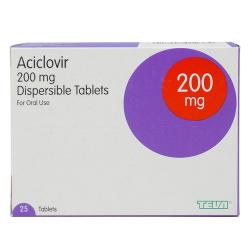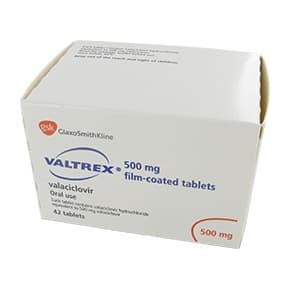Login to your account
- Private & confidential service
- Genuine medication
- All-inclusive service - No hidden fees
- Next day delivery
- Shingles
Shingles: start your consultation
- 1. Answer the online medical questions
- This helps our doctors to decide which treatment is safe for you
- 2. Select your treatment
- You will see a list of recommended treatments. You can select the one you prefer.
- 3. Checkout and delivery
- Once you’ve completed the checkout, our doctors will review your answers. If all is safe, you will receive your treatment tomorrow.

- Reduces symptoms
- Quickens recovery time
- Genital herpes, cold sores and shingles

- Reduces symptoms in 2 days
- Lessen outbreak duration
- For genital herpes, cold sores and shingles

- Reduces symptoms in 2 days
- Lessen the length of outbreak
- Genital herpes, cold sores and shingles
Shingles
Shingles is a viral infection caused by a strain of the herpes virus known as herpes zoster. It causes a painful rash, blisters (sores) across the skin and can generally leave you feeling quite unwell. Unlike other herpes infections (genital herpes and cold sores), you rarely catch it from someone infected with the virus.
The condition affects up to 1 in 5 people Trusted source UK Government Services and Information Government Source Go to source in the UK, but older adults aged over 70 years of age are at a higher risk of shingles. However, it can happen to anybody and it typically requires antiviral treatment to speed up recovery.
Topics
What causes shingles?
Shingles is caused by a specific strain of the herpes virus known as ‘herpes zoster’ or the varicella zoster virus (VZV), the same strain that causes chicken pox. This is distinct to the other common herpes infections which are caused by the herpes simplex virus (HSV), resulting in cold sores (HSV-1) and genital herpes (HSV-2).
Shingles is unlike other herpes infections because you rarely contract it from someone who has the virus. This is because most people contract VZV when they’re younger when they have chicken pox, which is extremely contagious. The virus remains in your body for the rest of your life but, for many, remains inactive. Shingles then only develops if the virus in your body reactivates, causing an outbreak of symptoms. It is not known exactly why the virus becomes active again later in life, but it is believed to be caused by your immune system being weakened or compromised. This is why certain groups of people are more at risk.
Risk factors of shingles may include:
- being older than 50
- having a condition that weakens your immune system (e.g HIV and AIDs)
- undergoing cancer treatment (radiation or chemotherapy)
- taking certain medications such as steroids or drugs designed to prevent organ rejection after an organ transplant
Is shingles contagious?
Because of the nature of shingles development, you cannot pass shingles onto people who have had chickenpox when they were younger. This is because they will already have the virus, albeit inactive, in their body. You also cannot contract shingles from someone who has chickenpox.
However you can spread the virus and cause chicken pox in those who haven’t had it, usually via direct contact with an open shingles sore. This is mainly true of children and infants, as they may not have caught the virus yet or have not had the chickenpox vaccine. If you think you have shingles, you should also be cautious around pregnant women who have not had chickenpox and people who have weakened immune systems.
What are the symptoms of shingles?
The first signs of a shingles outbreak are:
- tingling or severe pain in an area of skin
- headache, fever, nausea and feeling generally unwell
If it’s shingles, after a few days a rash will appear on either one side of the body, particularly on the chest or stomach. More uncommonly, a rash can appear on the side of the face and eyes, affecting the nerves surrounding the eyes (ophthalmic zoster) and ears (Ramsay Hunt syndrome, herpes zoster oticus).
A skin rash can often be difficult to diagnose, as many conditions cause similar skin reactions. However, shingles rashes have distinctive features and progression.
- only occurs on one side of your body
- starts as red blotches on the skin
- become itchy blisters that leak fluid
- blisters dry out and scab after a few days
- shingles on the face can cause difficulties with vision, hearing and movement on one side of your face
If you’re not sure if your symptoms are shingles, you should seek immediate medical advice.
What are the complications of shingles?
The most common complication of shingles is a condition known as post-herpetic neuralgia, affecting 1 in 5 people who have had shingles. It’s a condition that causes long-term nerve pain, sensitivity, tingling and numbness at the site of the shingles rash up to months and years after the rash has disappeared.
It is caused by the nerve fibers at the site of the rash being damaged. Typically, the pain receptors at the site of the rash send chemical messengers (neurotransmitters) through your nervous system, to the spinal cord and then up to your brain to trigger a pain response to the virus. However once these fibers are damaged, these pain signals are exaggerated and misfire when there is no virus causing the pain.
Other complications of shingles are rare, often occurring in less than 1% of cases of shingles, including:
- pneumonia
- vision loss
- hearing loss
- brain inflammation (encephalitis)
The risk of complications is significantly reduced if you take antiviral treatment within 3 days of your symptoms starting.
How is shingles treated?
The only way to treat the virus itself is by using antiviral drugs. They work by stopping the viral cells from reproducing and help the body’s natural defences to fight it off. This forces the virus back into a dormant state. There are several antiviral medicines available on prescription, including Aciclovir (Acyclovir), Valaciclovir (Valacyclovir) and Famciclovir.
You may want to take other medications to alleviate symptoms. You can take over-the-counter painkillers for the nerve pain such as paracetamol and ibuprofen. There are also lotions available to soothe the rash and any itching such as calamine lotion or you could apply a cold compress a few times a day. You should keep the rash clean and dry to avoid infection, however, it’s recommended you avoid any antibiotic or antiseptic creams as they can slow down healing.
Can I prevent shingles?
The best way to protect yourself against shingles is to get a shingles vaccine (zoster vaccine). They may have side effects (redness at the site of injection and headache), but they do not give you shingles. There are two types of shingles vaccines. They work in slightly different ways, both will guarantee long-term protection.
The vaccine recommended for most people is called Zostavax. It’s a live vaccine, meaning it contains a weakened form of the herpes zoster virus which your body fights off and develops an immunity to. It only requires one dose. However, Zostavax is not suitable for those with weak immune systems. These people are instead offered a non-live vaccine called Shingrix, which works similarly but also contains an ingredient that helps to boost the body’s immune response to the vaccine. You will require two doses of Shingrix.
Shingles vaccines are offered for free on the NHS in the UK for those between the ages of 70 and 79, as they are most at risk. However, they are suitable for those over the age of 50 through private healthcare providers. You should speak to your doctor if you’re worried about shingles and they can discuss these options with you.
How do I buy treatment online?
Here at HealthExpress, we offer several prescription antiviral medications including Aciclovir, Valaciclovir (Valtrex) and Famciclovir (Famvir) for the treatment of shingles. All you have to do is fill out a quick, confidential medical questionnaire that is reviewed by one of our registered doctors. Once approved for treatment, your medication will be dispensed and dispatched by our pharmacy with free next-day delivery.
medical form
medication
prescription
from pharmacy

